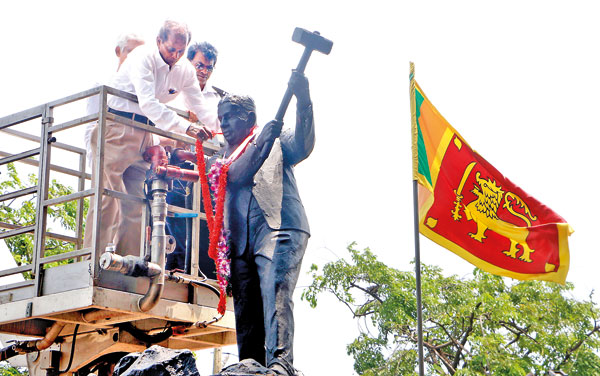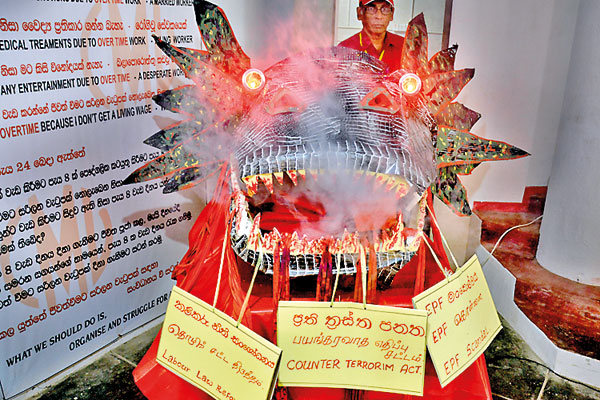News
Unions pay silent tribute to labour in shattered capital
View(s):Every year, thousands from the provinces board buses provided by political parties and leave for Colombo for May Day rallies.

Low key events: Remembering A.E. Gunasinghe, Sri Lanka's father of the labour movement. Pix by Ishanka Sunimal and Priyanka Samaraweera
But there were no labour chants this year in the capital and elsewhere, except for symbolic gatherings.
There is no normalcy yet following the bloodbath in churches, for which the political leadership is being called to account. The Catholic church hierarchy and Buddhist religious leaders have bemoaned the weak, unsatisfactory response, so far.
Islamic extremists blew them up in teams and slaughtered scores of worshippers, including dozens of children, in Catholic churches, and locals and foreigners in hotels on Easter Sunday.
The Sri Lanka Freedom Party (SLFP) held its May Day meeting at Sri Lanka Foundation Institute, where President Maithripala Sirisena joined, while Sri Lanka Podujana Peramuna (SLPP) gathered at Kotte Municipal Council with Opposition Leader Mahinda Rajapaksa. The United National Party (UNP) did not organise any public meetings.
UNP leader and Prime Minister Ranil Wickremesinghe chaired a meeting with tourism stakeholders to discuss industry concerns and respond.
The Tamil National Alliance (TNA) gathered at the party office in with Jaffna lawmaker, Mavai Senathirajah.
Trade unions also held symbolic meetings, while adopting some regulations with regard to labour rights.
The Ceylon Mercantile Industrial and General Workers Union (CMU), one of the largest comprising 23 unions, also marked May Day.

Ceylon Mercantile Industrial and General Workers Union (CMU), comprising 23 unions, marking May Day
CMU, general secretary, Sylvester Jayakody told the Sunday Times that even though there were difficulties in getting government approval for even a small meeting, at least 500 members gathered to adopt resolutions such as a demand to withdraw the Counter Terrorism Act (CTA), and ensuring labour rights through proper checks and balances at the Employee Provident Fund (EPF).
“This is not the first time we were asked by the government not hold any march or rally in view of May Day. Successive governments since 1971 time to time have called for such bans due to political reasons. However, we are aware of the current situation and took the decision to hold a small scale meeting considering public safety,” Mr Jayakody said.
Joseph Stalin, the general secretary of the Ceylon Teachers Union echoed public concerns over government failures to ensure public safety following the mass murders and merely halting labour day rallies.
In the north, trade unions such as the Non Academic Employees Union of University of Jaffna had low key labour day meetings.

